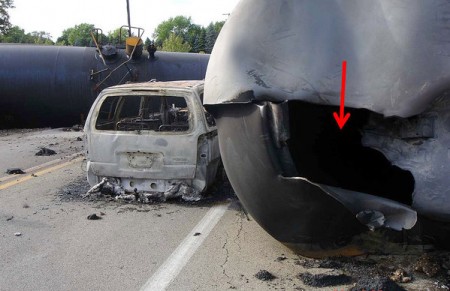Rail safety – if more rules are needed, who should write them?

A photo from a National Transportation Safety Board powerpoint from 2012 shows how DOT-111 tankers can puncture. Photo: NTSB.
The issue of rail safety continues to be large and complex. This past week the Canadian Press reported:
Transport Canada quietly approved new safety rules drafted by the railway industry on Boxing Day just as an emergency directive issued in the wake of last summer’s Lac-Megantic disaster was set to expire. [Edtor’s note: Boxing Day = Dec 26th.]
The federal department also reissued a new emergency directive on Jan. 1, again without public notification, covering those rail companies that are not part of the Railway Association of Canada.
The article discusses some specifics about Canada’s new safety standards and looks at a number of “big picture” questions – including the possibility of new rail safety regulations coming soon in the U.S. and the difficulty of implementing changes that may be required:
In fact, the integrated North American rail service means all shippers will be caught in the same supply-and-demand dilemma should new tank cars be required.
That’s because it will be a tall order to build enough new, stronger tank cars, said Larry Beirlein, a Washington-based lawyer with the Association of Hazmat Shippers, which provides regulatory legal advice to industry on the full gamut of hazardous materials, from gas cylinders to refineries to nail polish.
“You not only have very few builders of these kinds of cars, there are even fewer installations that could modify them,” he said in an interview.
“With thousands of cars across North America, I don’t think anything significant could be done in less than 10 years because of the backlog.”
As reported by the Minneapolis Star Tribune, pressure for improved regulations is mounting in the U.S., and Transportation Secretary Anthony Foxx stated his department would announce steps to improve safe transportation of hazardous material “in the coming weeks”.
Tags: canada, economics, energy policy, environment, rail safety, transportation





.jpg)


It is obvious that the folks who own and manage the industry/business/commerce and who are the de facto current writers of the rules supposedly constraining such institutions are not sufficiently concerned with any aspect of their endeavors other than the increasing of their personal bank accounts. The historical characteristics of moguls around the world has been, and is, to circumvent government restrictions upon their freedom to ravage the Earth and any and all living things upon it for their profit.
A casual perusal of the photo of the tanker in the article indicates that it was not punctured by an external force, but ruptured from within by either the ignition of whatever it was carrying or by the expansion of the contents due to external heating because the torn metal of the tank is protruding outward. Likely the design of a tanker that could withstand any/all of the forces applied in the advent of a significant derailing accident is not possible. Requiring multiple non-hazardous cargo cars between each and every crude carrying tanker car would probably be far more beneficial and more quickly implemented but far from popular with the oil barons.